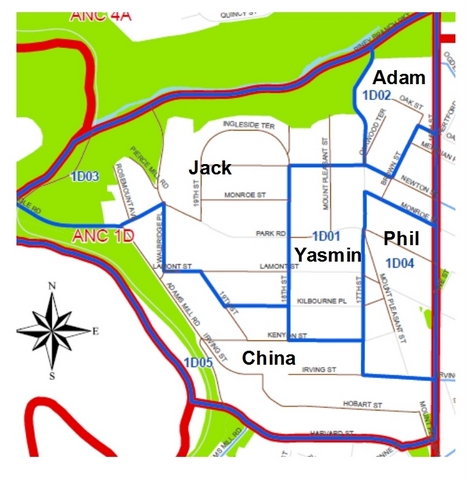What's an ANC? New arrivals in the neighborhood commonly ask that, because these seem to be unique to the District of Columbia. According to the District's Home Rule Charter, the District is to be divided up into "commission areas", and each such commission "may advise the District government on matters of public policy including decisions regarding planning, streets, recreation, social services programs, health, safety, and sanitation in that neighborhood commission area".
"Advise" is the operative word. The ANC is not your neighborhood government, and it has none of the powers of either the legislative nor the executive branches of government. All it does is consider proposed District actions affecting a neighborhood, and offer advice to the District government concerning those actions. The District agency receiving such advice is supposed to give that advice "great weight". Some are reasonably responsive to ANC advice; others pretty much ignore it, and there's no penalty for that.
There are 37 ANCs in the District (here's a map of them), and a total of 270 elected
commissioners. The position is unpaid, and it's hard to find people willing to
spend a lot of their time at this job, for nothing. I paid little attention to
our ANC, until they surprised me in 2000 with a very unfortunate decision
affecting me and my immediate neighbors, without a word to any of us. (I
continue to hear the complaint that residents don't know what the ANC is doing.
Yes, I've been a victim of that, myself. I do what I can to overcome that
communications shortfall.)
The ANC commissioners of that period were
utterly unrepentant, and in 2002 I decided that our ANC needed a new voice. If
the ANC system has a failing, it is that these positions tend to be dominated by
a handful of neighborhood activists, while the great majority of residents are
much too busy with home, family, and jobs to spend time on neighborhood
"politics". It's proven to be quite difficult to make our ANC truly
representative of the neighborhood, because so few residents have the time,
energy, and inclination to take on the unpaid task.
In 2002, with my physics career winding down, I decided to run for our Mount Pleasant ANC, and found myself elected to that position. Curiously, in that election year, all six Mount Pleasant commissioners declined to run for re-election, so the new ANC started work in January, 2003, with six novice commissioners. That made for a rough start. It takes a year or two for a new commissioner to become an effective commissioner, familiar with regulations, procedures, and DC Government officials.
I brought about two significant changes, intent on
improving neighborhood awareness of ANC activities. First, I provide a monthly
newsletter for my constituents, listing all of the ANC actions, so that they can
know what their ANC is doing, even if they never attend a meeting. This is
hand-delivered, 720 copies, to every household in my single-member district.
Nobody's ever done that before, and, so far as I know, I'm still the only ANC
commissioner in the District doing that. Second, I publish every ANC resolution
on two public Mount Pleasant Web sites, so that everyone in the neighborhood --
those with Internet access, anyway, which these days means a pretty substantial
number -- can keep track of what their ANC does.
My newsletters are
posted here. Our ANC also produces audio
recordings of its meetings, should anyone want to find out exactly what was said
at a meeting. (Our minutes are, as they should be, simply records of official
actions taken, and do not record discussions.) These audio recordings are here .
ANC commissioners are accountable to the
voters. Every two years there's a test of how well a commissioner is doing, as
evaluated by the electorate of his single-member district. In 2010 I was
re-elected to this position, in a year in which there was considerable effort to
replace 1D commissioners. It's said that opposition was considered, but I was
judged to be "very difficult to beat". I take that, and the hefty votes for me
in these elections, as evidence that I'm serving my neighbors well. The votes,
to date:
2002: 440 (vs. 40 write-ins)
2004: 694 (vs. 167 for my opponent,
Todd Kutyla)
2006: 425 (vs. 17 write-ins)
2008: 792 (vs. 42
write-ins)
2010: 461 (vs. 35 write-in)
2012: 856 (vs. 58 write-ins)
Mount Pleasant ANC commissioners:
|
|
2003-2004 | 2005-2006 | 2007-2008 | 2009-2010 | 2011-2012 | 2013-2014 |
|
1D01 |
Barbara Bitondo |
Wayne Kahn |
Jane Zara |
Phil Lepanto |
Yasmin Romero |
Yasmin Romero |
|
1D02 |
Will Grant |
Mitchell Backfield (Nov 2005) |
Oliver Tunda |
Oliver Tunda |
Laura Wilson Phelan |
Adam Hoey |
|
1D03 |
Jack McKay |
Jack McKay |
Jack McKay |
Jack McKay |
Jack McKay |
Jack McKay |
|
1D04 |
Jenny Babcock |
Gregg Edwards |
Gregg Edwards |
Gregg Edwards |
Gregg Edwards |
Phil Greiner |
|
1D05 |
Peter Muller |
Rich Wysocki |
Dave Bosserman |
Dave Bosserman |
China Terrell |
China Terrell |
|
1D06 |
Dominic Sale |
Angelia Scott (April 2005) |
Angelia Scott |
Angelia Scott |
Angelia Scott |
(SMD deleted) |

